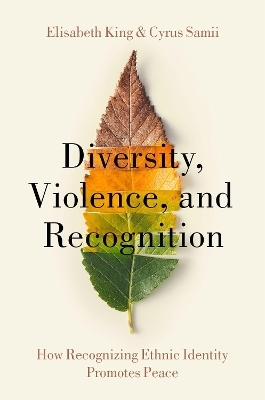
Diversity, Violence, and Recognition
Oxford University Press Inc (Verlag)
978-0-19-750946-3 (ISBN)
Elisabeth King is Associate Professor of International Education and Politics at New York University and Founding Director of NYU's minor in Peace and Conflict Studies. Her research interests include peace, development, and education in ethnically diverse and conflict-affected contexts. King uses research methods ranging from in-depth qualitative interviews and focus groups, to randomized field experiments and surveys, and works with policy-makers to link her scholarship with on-the-ground practice and programming. She is the author of From Classrooms to Conflict in Rwanda, named an Outstanding Academic Title by the American Libraries Association. Other work appears in journals such as Journal of Peace Research, World Development, and African Studies Review. King's research has been funded by grants from such organizations as the United States Institute of Peace, the Spencer Foundation, and the Folke Bernadotte Academy. She has consulted for organizations including Innovations for Poverty Action, Millennium Challenge Corporation, MasterCard Foundation, and UNICEF. King received her PhD in political science from the University of Toronto and was a postdoctoral fellow at Columbia University. Cyrus Samii is Associate Professor in the Wilf Family Department of Politics of New York University and Executive Director of the Evidence in Governance and Politics (EGAP) network. He writes and teaches on quantitative social science methodology and conducts applied research on governance in contexts where formal institutions are weak, the political economy of development, and social, economic, and psychological causes of violent conflict. He has designed and carried out field studies in sites across Africa, Asia, and Latin America. This research has been conducted in collaboration with partners from various international agencies, including the World Bank, United Nations, US Agency for International Development, UK Department for International Development, and Danish International Aid Agency, as well as non-governmental and civil society organizations in the respective countries. His work has appeared in leading peer-reviewed journals such as the American Political Science Review, American Journal of Political Science, Annals of Applied Statistics, Journal of Conflict Resolution, Journal of Labor Economics, Journal of Peace Research, Journal ofPolitics, Political Analysis, and Survey Methodology. He received his PhD in political science from Columbia University.
List of illustrations
List of Abbreviations
Part 1
Chapter 1: Introduction
Chapter 2: A Theory of Recognition
Part 2
Chapter 3: Trends in Ethnic Recognition
Chapter 4: Under what conditions is recognition adopted?
Chapter 5: What are the effects of ethnic recognition on peace?
Part 3
Chapter 6: Recognition under Plurality Rule and the Paradox of Recognition in Burundi
Chapter 7: Non-Recognition under Minority Rule and the Paradox of Non-Recognition in Rwanda
Chapter 8: Ethnic Recognition under Minority Rule in Ethiopia
Part 4
Chapter 9: Conclusion
Appendix: Statistical Tables
References
Index
| Erscheinungsdatum | 02.04.2020 |
|---|---|
| Verlagsort | New York |
| Sprache | englisch |
| Maße | 155 x 231 mm |
| Gewicht | 340 g |
| Themenwelt | Sozialwissenschaften ► Politik / Verwaltung ► Europäische / Internationale Politik |
| Sozialwissenschaften ► Politik / Verwaltung ► Staat / Verwaltung | |
| Sozialwissenschaften ► Politik / Verwaltung ► Vergleichende Politikwissenschaften | |
| ISBN-10 | 0-19-750946-0 / 0197509460 |
| ISBN-13 | 978-0-19-750946-3 / 9780197509463 |
| Zustand | Neuware |
| Haben Sie eine Frage zum Produkt? |
aus dem Bereich


